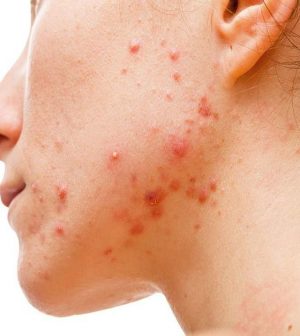- 10 Strategies to Overcome Insomnia
- Could Artificial Sweeteners Be Aging the Brain Faster?
- Techniques for Soothing Your Nervous System
- Does the Water in Your House Smell Funny? Here’s Why
- Can a Daily Dose of Apple Cider Vinegar Actually Aid Weight Loss?
- 6 Health Beverages That Can Actually Spike Your Blood Sugar
- Treatment Options for Social Anxiety Disorder
- Understanding the Connection Between Anxiety and Depression
- How Daily Prunes Can Influence Cholesterol and Inflammation
- When to Take B12 for Better Absorption and Energy
Acne’s Genetic Secrets Could Bring Better Treatments

For countless teens, it’s the scourge of adolescence. But researchers say the discovery of new genetic variants associated with acne could help doctors identify people at high risk and perhaps point the way to new treatments.
“Despite major treatment advances in other skin conditions, progress in acne has been limited,” said Catherine Smith, co-author of a new study. “As well as suffering from the symptoms of acne, individuals describe consequent profound, negative impacts on their psychological and social well-being,” said Smith, a professor of dermatology and therapeutics at Guy’s and St. Thomas’ NHS Foundation Trust in Britain.
“It’s exciting that this work opens up potential avenues to find treatments for them,” Smith added in a hospital news release.
For the study, the U.K. team examined whole genome data collected worldwide from more than 20,000 people with acne and more than 595,000 without the skin condition.
The analysis revealed 29 new genetic variants that are more common in people with acne, bringing the total number of known variants to 46.
A number of the newly identified variants are in genes linked to other skin and hair conditions. This may help improve understanding about the causes of acne, which could be a mix of factors, according to the authors.
The findings were published online Feb. 7 in the journal Nature Communications.
The investigators also found that people with the highest genetic risk of acne are more likely to have severe cases. Further research is required, but this suggests that it may be possible to identify people at risk of severe disease so they can receive early treatment, the study authors said.
“We know that the causes of acne are complicated, with a mix of biological factors such as genetics and hormones, and environmental factors,” said Michael Simpson, head of the Genomic Medicine Group at King’s College London. “Understanding the genetics of the condition will help us to disentangle some of these causes, and find the best way to treat the condition. This is a really promising area for further study, and opens up a lot of avenues for research.”
More information
There’s more on acne at the American Academy of Family Physicians.
SOURCE: Guy’s and St. Thomas’ NHS Foundation Trust, news release, Feb. 7, 2022
Source: HealthDay
Copyright © 2026 HealthDay. All rights reserved.










